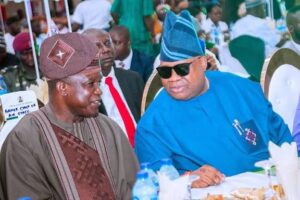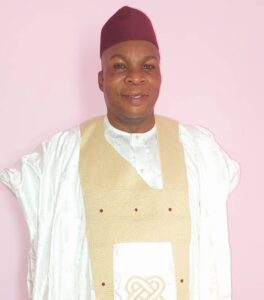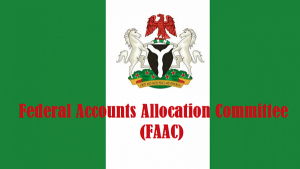
By Wahab Oba
At its core, governance is about people. It is the pursuit of human development, economic prosperity, the protection of lives and property, and the promotion of equity and inclusiveness, transparency, and accountability. It is not about white monuments and marble. It is about making a meaningful impact in the lives of citizens. It is not about rhetoric. It is about concrete and productive actions.
Today, that meaning has been tragically lost in Kwara. Under the leadership of Ògbéni Àlàdé, governance has become a weapon of destruction rather than a tool for transformation. Àlàdé’s administration has turned its back on the people, replacing economic sense with political showmanship and vendetta.
Consider the facts. As of the last national GDP rankings, Kwara State sits at 35 out of 36 states. This is not just a number. It is a verdict. It means our people are poorer, our economy weaker, and our future dimmer. Yet, instead of investing in rural development, agricultural infrastructure, or people-centered policies, Aládé is pouring billions into prestigious projects with questionable economic value.
The remodeling of the Kwara Hotel alone is gulping a staggering N23.4 billion, from the initial controversial N17.8b. The much publicised 11 storey Revenue House comes with a price tag of N20 billion, while the International Conference Centre is consuming N13.6 billion. Added to this, the state government is committing N4.5 billion to an Innovation Hub and another N3.7 billion to an ICT Centre, projects whose relevance and economic impact remain unclear to the average citizen.
Altogether, that’s over N65 billion sunk into glass, concrete, and political optics, while the average Kwaran remains poorer, jobless, and disconnected from the supposed dividends of democracy. What is the return on these massive investments? How do they contribute to food production, improve rural infrastructure, or create meaningful jobs for our teeming youth? How long will it take before they yield any tangible economic value, if at all? These are not legacy projects, they are legacy burdens.
Worse still, these projects were awarded under the table, without open bidding or competitive processes, in clear violation of the principles of transparency and due process. Shockingly too, they were handed to a single contractor from outside the state, sidelining capable, competent, and tested indigenous contractors who could have executed the projects efficiently while reinvesting in the local economy. Rather than empower local businesses and create a ripple effect of employment and economic growth, Àlàdé chose to outsource Kwara’s future to outsiders with no stake in our development.
Meanwhile, the real engines of growth, rural roads, farm settlements, and small scale businesses are neglected. Ògbéni Àlàdé’s administration continues to resurface already functional roads in the capital while leaving rural communities cut off and farmers stranded. Development should not be cosmetic, it should be catalytic.
But Àlàdé’s failures go beyond misdirected economics. They strike at the soul of society, livelihoods, and dignity. In the name of political revenge, he has repeatedly deployed the bulldozer where dialogue and development were needed, mindless of how the people feel. After all, good governance is also about consensus building.
It began with Crystal Place, a thriving commercial hub valued in the billions, demolished without fair compensation, leaving hundreds of vendors displaced and distraught. Then followed the destruction of markets and lock-up shops, where thousands of ordinary Kwarans earned their daily bread. These actions, masked as urban renewal, were in truth fueled by political vendetta and sheer callousness.
Even our cherished traditional institutions have not been spared. Traditional rulers, attending the burial of the Saraki matriarch, were summoned from Lagos to Ilorin in the dead of the night for a meeting that was never held. The 2021 Durbar, a culturally significant event that unites the Emirate and showcases Ilorin’s rich heritage, was canceled without consultation with the traditional authorities. Now, the administration has halted the construction of a Pavilion Project simply because it is associated with a perceived political opponent.
The timing and implications of this decision are particularly troubling. Had the Pavilion been allowed to proceed and completed as planned, it would have served as the central venue for the upcoming Durbar festival, a majestic celebration that draws visitors from around the world. The Pavilion would have offered a dignified setting for royal processions, performances, and honoured guests while also stimulating local commerce and promoting the Emirate’s cultural tourism. Denying the project is not only shortsighted; it is a blow to tradition, development, and pride. More than anything, this governor had denied the Emirate the benefit of a more than N500m federal project.
Even if, hypothetically, approvals were not properly sought, a responsible and emotionally intelligent leader would have intervened constructively. He would have facilitated the necessary endorsements in deference to tradition and as a mark of humility. But Àlàdé neither listens nor respects. This is the same man who demolished Ile Arugbo, the political capital home of the Sarakis, despite passionate appeals from prominent leaders and the sentiments of the people.
Worse still, as the Durbar draws nearer, residents must brace themselves for further acts of political insecurity. We may yet witness the pulling down of billboards and banners sponsored by perceived rivals, an increasingly common tactic by this administration to suppress any form of political expression not aligned with its interests. Rather than use the festival to unite the people, Ògbéni Àlàdé may yet poise to weaponise it to deepen divisions.
What we are witnessing is not governance. It is vindictiveness dressed as reform. It is ego-driven leadership devoid of empathy and vision.
Kwara deserves better than a ruler who demolishes more than he builds. We need leadership that empowers people, not one that persecutes them. We need a leader who knows and values our culture. Governance should be a bridge, not a bulldozer. It should heal, not hurt. It should uplift, not uproot.
History will not be kind to the number of skyscrapers Àlàdé commissioned. It will remember the lives diminished and the billions unaccounted for. It will remember the institutions he undermined and the dreams he derailed. For when he had the power to build, he chose instead to tear down.
Ẹni àwífún, Ọba jẹ ògbọ̀



![[OPINION] Hon Omituntun: Redefining Grassroots Leadership In Offa By Abdulrahman Bashir Kehinde Leadership is not measured by promises, but by the tangible impact it makes on the lives of the people. In this regard, the Executive Chairman of Offa Local Government, Hon. Suleiman Olatunji Omituntun, continues to distinguish himself as a leader whose actions speak louder than words. Through visionary initiatives and people centered projects, Hon. Omituntun has redefined grassroots governance. His interventions in education, social welfare, youth empowerment, and community development have not only uplifted lives but also rekindled hope in inclusive and responsive leadership. What makes his governance style truly remarkable is his deliberate commitment to listening to the people and responding to their needs. At a time when many public officials appear disconnected from the grassroots, Hon. Omituntun has demonstrated that governance is most effective when rooted in empathy, accessibility, and accountability. Within just 12 months in office, Hon. Omituntun has proven his capability beyond doubt. His leadership is building a legacy that goes beyond physical projects it is nurturing trust, inspiring civic participation, and laying a solid foundation for sustainable development. Indeed, he exemplifies the truth that progress at the local government level has the power to transform entire communities. As responsible citizens, we must not only commend Hon. Suleiman Olatunji Omituntun for his people oriented leadership but also rally behind his vision, ensuring that Offa Local Government remains a beacon of purposeful governance for generations to come. Abdulrahman Bashir Kehinde writes from Osolo/Akosin, Shawo Central, Offa.](https://newsbulletin.com.ng/wp-content/uploads/2025/09/1757692107240-214x300.jpg)





